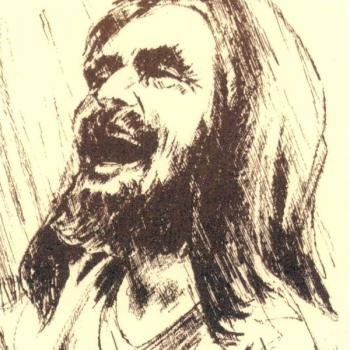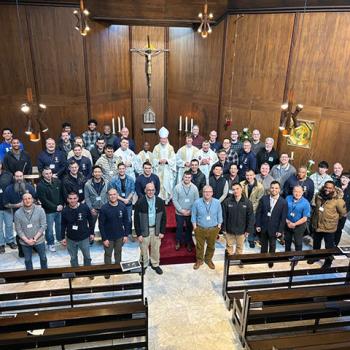Lectionary Reflections
Epiphany Sunday
Isaiah 60:1-6
It is the day of the Lord's appearing, more specifically "a visible manifestation of a hidden divinity," as the older Bauer New Testament Lexicon defines it (p. 304). The Greek word from which we derive the name of this day of celebration is precisely "epiphaneo," which is the combination of the preposition "epi," usually meaning "upon" and "phaino," meaning "to shine." In this combination the preposition appears to increase the power of the verb, hence meaning something akin to "super nova shining," a very bright glare indeed!
And so epiphany has been seen for many centuries. Matthew's gospel provides the narrative backdrop, with Lukan ideas thrown in for good measure. According to Matthew, the evil Herod hears of some unknown "king of the Jews" who has been born somewhere in his kingdom. Some Magi from the east are on their way to Israel to "pay him homage." The frightened Herod gathers his religious toadies and demands to know just where this king might be. They tell him of a verse from Micah 5:2 that mentions the tiny city of Bethlehem that is predicted to be a place from which "shall come a ruler who is to shepherd my people Israel." Herod immediately cooks up a plan to get rid of this would-be king.
He calls for the Magi to tell him the "precise time when the star" they have been following appeared, claiming that he wants himself to go to the child "and pay him homage." In reality, the terrified king has only murder in mind, and later will kill countless babies in the attempt to rid himself of this rival monarch. The Magi dutifully follow their bright star to Bethlehem, the star that stops right over the place where the child has been born. They "pay him homage," as they have promised to do, and they offer to the child rich gifts—gold, frankincense, and myrrh. And after being warned in a dream not to go back to Herod with this news, they take another route back to their eastern countries. (See Mt. 2:1-12.)
Long tradition, of course, has added to this dramatic scenario by tossing in Luke's shepherds, the heavenly angelic chorus that they heard, and the shepherd's own rush to the place of the baby's birth. Throw in the "ox and ass," perhaps a camel or two, a lowly donkey, and you have the ingredients for the ubiquitous Christmas crèche that can be found in plastic or olive wood in many parts of the Christian world.
But there is another source of this famous scene, and that is Isaiah 60. Many of the familiar story's ingredients are to be found there. The chapter begins, "Arise! Shine! Surely your light has come; the glory of YHWH has come forth upon you!" This third section of the book of Isaiah spends a good bit of its time speaking of YHWH's imminent appearance for the salvation and reappointing of the city of Jerusalem, the nation of Israel, and the people of YHWH. Such language implies that things are not going well for any of these three during the time of this prophet. In short, Israel is desperately in need of the glare of YHWH's epiphany.
And here it comes, says Isaiah. And are we glad! "Look! Darkness covers the earth, dense darkness the peoples, but YHWH comes forth upon you, YHWH's glory appears over you. Nations will come to your light, kings to the glare of your dawn" (Is. 60:2-3)!
The claim that YHWH's light will draw "kings" to this light is the reason that the Magi of Matthew morphed into the kings of hymn and legend. And the fact that these kings, drawn to the radiant light of YHWH, bring "the wealth of the nations" with them (60:5), leads later to the more exact designation of those gifts, namely "gold and frankincense" (v. 6). Note also that the wealth includes "camels" as well as "flocks of Kedar and rams of Nebaioth" (v. 7). Thus, our Christmas crèche is now complete; we have the "kings," the gifts (minus Matthew's myrrh), and the animals. But most importantly we have the light in the midst of our prevailing dense darkness.
And it is the light of YHWH, the light of the Lord, that illuminates and finally eclipses all kings, all animals, all gifts. It is little wonder that so many services of worship during the season of Christmas are held in the darkness, in the late evening, the time of densest gloom. And little wonder that the darkness is pierced by flickering candles, their wax dripping onto our trembling hands, as we join our God in dispelling the fears that always lurk in our darkness. The ancient 6th and 5th century B.C.E. Israelites, faced with the destruction and ruin of their sacred city and the exile of their promised dreams, longed for the light of YHWH, the glory of YHWH to lead them from their darkness into God's marvelous light.
And we Christians long again for the same light, the light of God, given anew to us in the person of the tiny baby of Bethlehem. This baby is feared by those who would cling to their comfortable power, but worshipped by those who would use their vast wisdom as gifts for the child, thus announcing that power is made perfect in weakness and wisdom made perfect in humble simplicity and homage. We 21st-century Christians are no different from our 2,600-year-old Israelite forebears. We need this light; we long for this light, for our darkness is dense over our lands and our peoples. And so we cry once again, "Come, Lord Jesus, the light of the world," that light that the world has never and can never extinguish.
1/5/2012 5:00:00 AM





